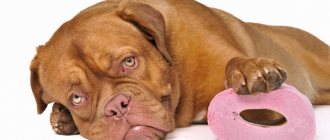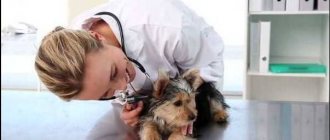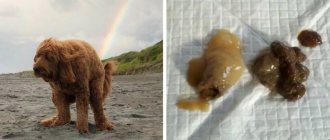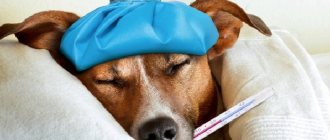Reasons for diarrhea in a Yorkie, why did a Yorkie have diarrhea
I really want such a cute creature as the Yorkshire Terrier to never have any diseases. Therefore, when a puppy suddenly begins to experience debilitating diarrhea, weakness and frequent nausea, it is necessary to take decisive action. There are quite a few reasons that provoke such a reaction of the digestive system in the form of severe diarrhea. What are the main and common causes of diarrhea in a Yorkie puppy or adult Yorkshire terrier:
1 helminthic infestations can cause frequent diarrhea;
2 incorrect diet (introduction of fatty, sweet, smoked foods);
3 Allergic reactions to certain types of food can cause severe diarrhea in your puppy. Sometimes diarrhea in a Yorkie due to food can also occur in an adult;
4 dysbiosis of the mucous membranes of the digestive organs due to insufficient production of enzymes, disturbed by the food consumed;
5 forced therapy with strong antibiotics;
6 food and non-food intoxication;
7 overeating can cause diarrhea in a dog;
8 even changing food can change a dog's stool;
10 climate change.
The Yorkshire Terrier, for all its attractiveness, cannot be considered an overly clean animal; it must be constantly monitored. When walking in park areas or within residential areas, the owner simply needs to observe what his pet is doing.
What can be done to prevent a Yorkie puppy from having diarrhea? What methods exist to prevent diarrhea in dogs? The first thing you should understand is that there are a number of factors, in addition to the pet’s diet and health, that can cause diarrhea in an adult Yorkie or his puppy. Namely: it is categorically and strictly necessary to prohibit the animal from picking up leftover food and feces of other animals that may be on footpaths and in the lawn grass. Most often, diarrhea in Yorkies occurs after walking in areas unorganized for dog walking, where you can see a large number of foreign objects.
Diarrhea without fever and vomiting
If the dog has only loose and frequent stools, but there is no fever or vomiting, then the cause of diarrhea is most often:
- binge eating;
- mild intoxication with low-quality food;
- abrupt introduction of new food to the menu;
- food allergies;
- side effects of drugs.
In this case, it is necessary to reconsider the animal’s diet. Usually, when the diet is normalized, diarrhea disappears. If your dog is taking any medications, you should contact your veterinarian to adjust the treatment regimen.
Yorkie has diarrhea with blood or blood in it
The owner should pay special attention to diarrhea in the pet with blood impurities. While walking with your dog, you should monitor the shape, consistency and composition of the stool that comes out. Bloody diarrhea in a small dog like a Yorkie requires immediate attention. With such a problem, you urgently need to seek help from a veterinarian. Blood loss, which can be significant through damage to the mucous membranes of the intestines or other internal organs of the digestive system, can even lead to the death of the animal.
Whether bloody diarrhea in a Yorkie with streaks of blood in the stool or obvious traces of blood is dangerous depends on what exactly caused the bloody diarrhea in the dog. The reasons why bloody diarrhea may occur include the following:
1 enterocolitis caused by injuries to the intestinal walls can cause severe bloody diarrhea in a dog (this is how fragments of bones or other foreign objects enter the body);
2 severe intoxication with poor quality food products;
3 parvovirus enteritis may be accompanied by symptoms of diarrhea with blood - a dangerous infectious disease that rapidly affects the mucous membranes of the digestive system, leading to death without proper treatment;
4 external trauma to internal organs often leads to the appearance of blood in the feces of both an adult dog and a puppy, for example, a sudden fall from a great height onto hard ground or sharp objects.
Can a Yorkie have bloody diarrhea from pills, drugs and other types of medications? It is extremely rare that bloody diarrhea in a Yorkshire Terrier occurs under the influence of medications for helminthic infestations or with frequent overeating. If they arise for such reasons, then the release of blood clots is very insignificant, quickly disappearing with subsequent bowel movements. If black stool appears in Yorkshire Terriers, you should be wary, because this may be the result of bleeding in the upper parts of the digestive system, stomach or duodenum. With such symptoms, even if the animal does not show noticeable anxiety, consultation with a veterinarian is simply necessary.
Diarrhea and vomiting
Very often, diarrhea in Yorkshire Terriers is accompanied by vomiting. This is also usually associated with eating disorders. The body thus strives to get rid of excess food or poor quality food.
In some cases, these symptoms may be caused by inhaling fumes from toxic chemicals. In this case, the dog experiences a sharp deterioration in health and lacrimation. Foam vomiting is usually observed when foreign bodies enter the stomach.
Diarrhea with vomiting is also a sign of worm infection. Parasites can also leave the body during deworming.
Diarrhea in a Yorkshire Terrier puppy
Due to the fact that the fragile body of such a small dog as a Yorkie, and even at a “childhood” age in comparison with adults, does not yet have all the necessary resources to fight infections. The protective functions of the puppy’s body do not always work on time, which can even lead to its sudden death. The causes of diarrhea in Yorkie puppies can be completely banal and very serious. Digestive upset in the form of diarrhea in puppies of different dog breeds is often a response to vaccination. After all, a vaccine often provokes all the signs of the diseases for which the animal is vaccinated. Thus, the infection seems to occur in the body in a latent form. You should consult in detail with the veterinarian administering the vaccination about how to react to possible side effects after vaccination and what measures to take. The doctor is responsible for the animal he vaccinates.
Can a Yorkie die after a vaccine? There are frequent cases of death of animals after poor-quality vaccination. The thing is that, in order to save money, some veterinarians working privately do not comply with the rules for transporting and storing the vaccine. Therefore, it is necessary to vaccinate your pets only in clinics that have a good reputation.
In most cases, diarrhea in puppies is a consequence of overfeeding the pet. After all, at this age, the baby still has poor control over the size of his portions. It is possible that many owners will have to restrain their dog’s appetites throughout their dog’s life. A small dog's intestines are often unable to cope with large portions of food consumed. Excessive fluid intake can also cause the same symptoms. Usually, if diarrhea is caused by a large amount of fluid, the stool looks watery without unnecessary pathological impurities. It is not uncommon for growing puppies to have varying amounts of mucus in their stool. This is the first sign of the development of inflammatory processes in the lower intestines. If these symptoms occur, a visit to the veterinarian should be made as soon as possible after detection.
How to treat diarrhea in a Yorkie, what to do
Owners of Yorkshire terriers or other dog breeds do not always think seriously about the health of their pet. Often people simply do not notice the first signs of the development of the disease, not only in an adult dog, but also in a puppy. So what should you do if your dog suddenly develops severe and prolonged diarrhea?
First of all, having discovered severe diarrhea in your pet, the owner should not panic and take chaotic actions. Basically, the problem can be solved at home by prescribing the correct treatment. The first step should be to identify the cause of the diarrhea. If diarrhea occurs with blood, the animal needs emergency care, because the intestinal walls can be seriously damaged, and intestinal contents exiting through the perforation into the abdominal cavity can immediately lead to death.
What can you do to give your dog if he has diarrhea before he needs to be taken to the vet? Before showing your pet to a veterinarian, you can give sorbents at home that will reduce the level of intoxication in the body. If the animal experiences pain syndromes, you can give an injection of “No-shpa”. For a small dog, it will be enough to administer 1 ml of liquid drug intramuscularly. It is advisable, of course, that the dosage be calculated by a veterinarian. By turning to a specialist for help in a timely manner, you can get your pet back on its feet in a matter of hours and avoid serious complications.
It should be recognized that diarrhea in Yorkshire terriers is far from rare. As the dog gets used to the environment, and the owner gets used to his new pet, you can learn to quickly overcome such unpleasant conditions at home. The most important thing is to correctly establish the cause of the ailment and provide appropriate assistance, without leading to a critical state by delaying time and carrying out inappropriate measures.
What to do if your Yorkie has diarrhea?
The Yorkshire Terrier requires special attention. This dog breed has an excellent appetite. Caring owners often pamper their pet with sweets. But the puppy’s digestive system does not always cope with such food. Diarrhea in your Yorkie can lead to rapid dehydration.
When to contact a veterinarian
A Yorkie's diarrhea that continues throughout the day should not go unnoticed by the owner. You should not assume that the dog will recover on its own. Contacting a veterinarian should not be delayed if the following symptoms appear:
- there was diarrhea with vomiting, the diarrhea persisted, but the dog stopped vomiting;
- the Yorkie has become lethargic, does not respond to his owner’s calls to him, and has lost interest in everything;
- the temperature rises sharply;
- the dog does not eat, does not drink, does not even react to its favorite treats;
- blood appeared in the stool;
- The terrier is rapidly losing weight.
How are the causes of diarrhea identified?
Diarrhea in a Spitz, Yorkie or any other dog does not just happen. If the pet has not been subjected to stress, the owner is confident in the quality of the food and has not changed the diet, then you need to take the animal to a veterinary clinic. To identify the cause of diarrhea, a number of studies will be carried out:
- biochemical blood test - to identify liver pathologies;
- CBC – for iron deficiency, inflammation, determination of dehydration;
- stool analysis to identify parasites;
- X-ray – identifying the presence of foreign bodies in the gastrointestinal tract, checking the condition of internal organs.
Causes of diarrhea in Yorkies
Digestive disorders in dogs can occur for various reasons:
- The Yorkshire Terrier should not be constantly fed fatty, salty or too sweet foods. Such food can lead to severe poisoning. Keep an eye on expiration dates on canned dog food. Expired food should be thrown away.
- Infection with worms leads to intestinal blockage. Parasites cause nausea in dogs. The mucous membranes of a sick animal become inflamed, and diarrhea occurs. In this way, the body tries to get rid of parasites that are actively reproducing in the intestines.
- Yorkies are considered indoor dogs that tend to be overweight. Do not overfeed your pet. Although many pet owners do not think about what they feed their dog. Regular overeating leads not only to obesity, but also to diarrhea. In some dogs, this disease is accompanied by bouts of vomiting.
- Diarrhea in a Yorkie can occur due to dysbiosis. The cause of microflora disturbance may be poor-quality food. While walking, your pet may accidentally eat spoiled food.
- Diarrhea is often caused by an allergic reaction to certain components of the feed. It may contain various food additives that are not suitable for dogs.
- The digestive organs of puppies instantly respond to a change in food. New food should be introduced into the diet gradually so that the pet’s body has time to adapt to unfamiliar ingredients.
You can determine that a Yorkshire Terrier has diarrhea based on several signs:
- Your pet's bowel movements become more frequent.
- The stool becomes liquid and mucous discharge appears.
- The puppy suffers from chills and becomes lethargic.
- The disease leads to loss of appetite. The puppy refuses to go to the food bowl.
- The dog suffers from constant bouts of vomiting.
- Diarrhea in a Yorkie puppy leads to rapid weight loss.
- A sick pet suffers from dehydration.
- Pay attention to the color of the stool. Black stools may indicate the development of internal bleeding.
- Discharge from the eyes and cough are a symptom of the plague. Only urgent hospitalization can save a sick animal.
Stool color
It is important to pay attention to the color of the feces. Unusual coloring of stool may be a sign of serious pathologies:
- Black feces This color of stool is a formidable sign. Tarry stool is a symptom of bleeding from the stomach or upper intestines due to ulcerative pathologies.
- The stool is white. Discolored stool is released when the bile ducts are blocked. This is accompanied by serious dysfunction of the gastrointestinal tract. Pieces of undigested food can be found in feces.
- Green feces The stool acquires this color in cases of severe poisoning with rotten food. This is a rather dangerous sign that indicates severe intoxication. Typically, the discharge of green feces is always accompanied by severe repeated vomiting.
Diagnostics
To find out the cause of digestive disorders in Yorkies, several procedures are used:
- Experts check your dog's stool to determine the presence of various parasites.
- A general blood test can reveal the presence of inflammatory processes, iron deficiency and the degree of dehydration.
- To determine pathologies of the liver and kidneys, a biochemical blood test is performed.
- Using an abdominal x-ray, specialists evaluate the condition of the dog's digestive organs. In the image you can see foreign bodies, the presence of liquid and gas.
- Cytological tests are used to identify protozoa that may cause diarrhea.
Methods for treating indigestion in Yorkie puppies
Experts do not recommend feeding your dog on the first day of diarrhea. Eating food will only worsen the symptoms of diarrhea. To prevent dehydration, it is necessary to provide your dog with unlimited access to clean water. Choosing a treatment method requires special research.
When infected with viruses, hyperimmune serums are used. They contain antibodies that help the animal get rid of the infection.
To destroy harmful bacteria, the doctor prescribes antibiotics. Dysbiosis can be cured with the help of probiotics.
To relieve symptoms of intoxication in case of poisoning, adsorbents (Enterosgel, Smecta) are used. If intestinal spasms occur, it is necessary to add Papaverine to the puppy’s food.
Intense diarrhea leads to rapid dehydration. IVs are used to treat such dogs.
Dog's diet for diarrhea
It is not recommended to feed your Yorkie during the first day of diarrhea. Food will further irritate the gastrointestinal mucosa, which will intensify the symptoms of diarrhea. It is imperative to give the terrier more clean water and decoctions.
When your Yorkie's diarrhea begins to stop, the diet consists of the following products:
- rice porrige;
- dairy products;
- boiled vegetables;
- hard-boiled chicken eggs;
- boiled poultry or beef.
If your Yorkie's regular diet consists of ready-made commercial food, you should replace dry food with liquid food.
What not to feed
When treating your Yorkie for diarrhea, you should exclude the following foods from the diet:
- raw meat and fish;
- dry food;
- carrot;
- cabbage;
- everything is fried and fatty.
After intestinal motility is restored, you need to gradually return the dog to its usual diet.
Preventing diarrhea in Yorkies
You can avoid diarrhea in your puppy if you follow a few rules:
- Do not ignore your veterinarian's recommendations regarding diet. Yorkies have an increased appetite. They are naturally prone to obesity. Overeating can lead to diarrhea. The dog's diet should be balanced.
- Constantly monitor your dog's health. Diarrhea is not an independent disease. Loose stools only indicate a malfunction of the digestive system. If the color or consistency of your puppy's stool changes, you need to react immediately, as the disease can develop quite quickly.
- Bring your pet to the clinic regularly to be tested for infectious diseases.
Therapist. Practicing doctor. Work experience - 9 years.
Yorkie has diarrhea: what to do, how to treat it.
When deciding to get a pet, a person takes on a huge burden, because he must bear responsibility for a small creature. Some people don't realize the serious problems they can face when choosing purebred dogs. Yorkshire terriers are extremely popular. These small creatures have a fragile physique and an excellent appetite, which is why Yorkies have diarrhea very often. Purebred dogs are prone to many infectious and viral diseases, which the owner must be able to promptly identify and eliminate.
Provocateurs of diarrhea in purebred dogs
Loose stools in a Yorkie can appear for various reasons, some of which do not require the intervention of a veterinarian, while others cannot be avoided without serious drug treatment. While pampering their puppy with goodies, owners often do not pay attention to the quantity and quality of food. A small stomach cannot cope with large volumes of food and the gastrointestinal tract malfunctions. Undigested food begins to ferment in the stomach, and then slowly moves through the intestines. This condition causes diarrhea and dehydration in your Yorkie. It is dehydration that poses the greatest threat to a dog’s life, as it can be fatal if treatment is not started in a timely manner.
Diet
For diarrhea, Yorkies are prescribed a strict diet. Veterinarians recommend not feeding your dog on the first day after the onset of the disease. However, you should give your pet as much water as possible. After all, with diarrhea and vomiting, the body loses a lot of fluid.
In the following days, you can give the animal the following foods:
- rice cooked in water;
- boiled chicken breast without skin;
- boiled potatoes;
- skim cheese.
It is strictly forbidden to feed a sick dog the following food:
- raw meat;
- fried foods;
- sweets;
- fatty meat products and pork.
This diet must be followed until the diarrhea stops completely. In the future, the Yorkie's diet is gradually expanded.
How to cure a terrier from diarrhea?
A Yorkie's diarrhea caused by viruses should be treated with hyperimmune serums. They contain antibodies to a specific pathogen. To destroy harmful bacteria and infectious intestinal diseases, the veterinarian prescribes antibiotics. Mucus discharge and loose stools in your Yorkie can be treated with anti-inflammatory medications and antiparasitic medications. If enteritis occurs, Papaverine is prescribed (1-2 mg per 1 kg of weight).
The selection of drugs is based on the strain of the bacterium that causes diarrhea. To treat diarrhea in a Yorkie at home, regardless of the provocateur of the disease, Lingin is prescribed. For adult dogs up to 10 kg, 0.1 ml of the substance per kg of weight is indicated. This drug has a sorbing, antidiarrheal effect. If loose stool in a Yorkie is caused by poisoning or overeating, it is recommended to crush a Polysorb tablet, activated carbon and add it to dry food. If the pet refuses to eat food, the tablet is diluted in 50 ml of water and administered into the mouth using a syringe. To restore the intestinal microflora, you need to give your Yorkie Linex or Laktiale for diarrhea. The dosage of these drugs is chosen to be minimal; in the instructions it is indicated “for a newborn child.”
Now you know how to treat common diarrhea and bloody diarrhea in your Yorkie. Of course, if your efforts do not bring results within 24 hours, be sure to go to the veterinarian. There are a number of diseases that cannot be treated at home. One of these diseases is plague. If you notice foam near your Yorkie's mouth, this means that neither the doctor nor your efforts will help him. By visiting a veterinarian for preventative purposes at least once every six months, you will minimize serious health problems for your pets.
Causes of diarrhea
- Cheap and low-quality food;
- A sharp transition from dry food to natural food and vice versa;
- Stale or spoiled food;
- Allergy to a specific product or ingredient;
- Changing the brand of food;
- Infection with parasites (worms);
- Side effect after taking the drug ;
- Failure of the gastrointestinal tract;
- Consequences from swallowing a small object
How to help your four-legged friend?
Before starting treatment, you need to find out the reason why the diarrhea occurred. To do this, you need to remember what you fed your pet the day before . If this is a new product, then it must be excluded from the diet. If your pet eats a lot, reduce his dose.
What to do if diarrhea still does not go away, and the measures taken did not help? Start treating your four-legged friend.
- Do not feed your pet during the day;
- Give your dog adsorbents. They will remove toxins through the intestines;
- If diarrhea lasts more than a week, give your pet an antibiotic;
- Deworm your pet using special preparations.
- Give your dog clean water and small portions.
The dog has loose stools and vomiting.
Now you know what to do if your dog just has diarrhea . But what if diarrhea is also accompanied by vomiting? If your dog vomits once, don’t panic. But if vomiting occurs repeatedly, the dog is lethargic, has a fever and refuses to eat, take him to the vet .
Vomiting and diarrhea can be a symptom of poisoning or a sign of a serious illness. If your dog is vomiting foam and has mucus and blood in it, this may mean that your pet has swallowed a small object and it is stuck in the intestines.
Let's look at some other reasons why a dog may vomit.
- Stale food;
- Binge eating;
- Swallowing a small object;
- Fatty food;
- Transition from one power system to another;
- Bloating;
- Chemical poisoning;
- Helminthiasis.
Vomiting and loose stools can also be a sign of a viral infection :
- Rotavirus and coronavirus. This infection can affect any dog at any age. Recovery occurs within a week.
- Plague. This disease affects young dogs. They refuse food and water. If not treated in a timely manner, the animal may die.
- Adenovirus. A dog can get this disease at any age . It is accompanied by inflammation of the eyes and enlargement of the liver. Recovery occurs within two weeks.
How to treat a dog for vomiting
If the dog has vomited no more than three times, then the treatment will be the same as for diarrhea . But if the animal vomits repeatedly and has loose stools, you should contact a veterinarian. He will conduct an examination, identify the exact cause, and prescribe treatment.
Diarrhea with mucus or blood
What to do in such a situation? As a rule, the presence of blood or mucus in the stool is a sign of an inflammatory process. Only a veterinarian can voice the exact cause after an examination: abdominal x-ray and stool analysis .
Causes of diarrhea with blood and mucus:
- The intestines are damaged. This can only happen if the dog has swallowed a sharp object:
- Dysbacteriosis;
- Pancreatitis;
- Stomach ulcer;
- Presence of worms;
- Rabies infection;
- Poisoning with poison or medications;
- Presence of intestinal infection;
- Plague infection;
- Tumor formation in the intestine;
- The presence of parasites in the internal organs or intestines.
Treatment of diarrhea with blood (mucus).
To help the dog, you need to conduct an examination that will help you understand how advanced the disease is and what needs to be done. Depending on the severity of the disease, wound healing drugs are prescribed. Severe intestinal damage may even require surgery.
If the dog is poisoned, wash out the stomach and give antibiotics and adsorbents.
For worms, antiparasitic drugs are given. To cope with bacteria , probiotics are given, which boost immunity.
Viral and intestinal infections are treated with antiviral agents and antibiotics.
Diarrhea of unknown color
If your pet has diarrhea of unknown color, this is a sign of illness. Let's figure out what the specific color of diarrhea could mean.











